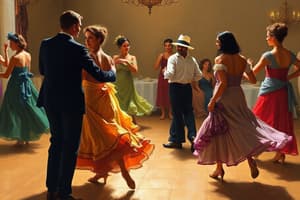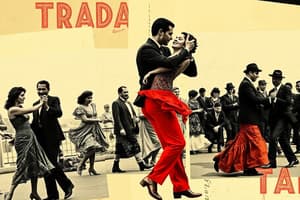Podcast
Questions and Answers
Which of the following best describes the rhythm characteristic of the cha cha?
Which of the following best describes the rhythm characteristic of the cha cha?
- Giving it a lively and rhythmic feel that combines both percussion and melodic elements (correct)
- ballroom dance
- Fast-fast-slow sequence
- Its a dance
What is the primary origin of the cumbia dance?
What is the primary origin of the cumbia dance?
- Argentina
- Panama and Colombia (correct)
- Brazil
- Jamaica
The tango is most closely associated with which two countries?
The tango is most closely associated with which two countries?
- Cuba and Jamaica
- Brazil and the USA
- Argentina and Uruguay (correct)
- Panama and Colombia
What is a defining feature of the rumba dance?
What is a defining feature of the rumba dance?
Which instrument is considered most important in bossa nova music?
Which instrument is considered most important in bossa nova music?
Reggae music is most associated with which country?
Reggae music is most associated with which country?
Which of the following statements is true about the foxtrot dance?
Which of the following statements is true about the foxtrot dance?
What does the term 'bossa' refer to in the context of bossa nova?
What does the term 'bossa' refer to in the context of bossa nova?
What is the primary function of African traditional music?
What is the primary function of African traditional music?
Which of the following genres is characterized by its lively rhythm and connection to swing dance?
Which of the following genres is characterized by its lively rhythm and connection to swing dance?
Which musical genre is known for its connection with the Yoruba style and is used to wake worshippers after fasting?
Which musical genre is known for its connection with the Yoruba style and is used to wake worshippers after fasting?
What unique instrument is formed from the horn of the kudu antelope?
What unique instrument is formed from the horn of the kudu antelope?
In which music genre is guitar accompaniment influenced by mbira-based styles?
In which music genre is guitar accompaniment influenced by mbira-based styles?
Which genre evolved into African Jazz and originated from South African township music?
Which genre evolved into African Jazz and originated from South African township music?
Which African music genre is a fusion of West African and black American music?
Which African music genre is a fusion of West African and black American music?
What characterizes the dance movements in the Kwassa Kwassa style?
What characterizes the dance movements in the Kwassa Kwassa style?
Flashcards are hidden until you start studying
Study Notes
Latin American Dance and Music Forms
- Cumbia: A courtship dance originating in Panama and Colombia, featuring European and African instrumentation and characteristics.
- Tango: A popular Argentinian and Uruguayan dance with roots in Cuban contradanza, habanera, and Cuban tango. It is a significant part of Argentinian national expression.
- Cha Cha: A ballroom dance that originated in Cuba in 1953. Derived from the mambo, it features a characteristic 2-3-1 rhythmic pattern with syncopation on the fourth beat.
- Rumba: An Afro-Cuban dance performed in a duple meter with a tresillo rhythm. It is commonly used in ballroom dancing, where couples or solo dancers execute a fast-fast-slow sequence with hip rocking and cross rhythms.
- Bossa Nova: A Brazilian musical genre characterized by its swaying feel and nasal vocal style. It focuses on themes of love, longing, nature, and youthfulness.
- The nylon-stringed classical guitar is a key instrument in bossa nova.
- Sitti Navarro is known as the "Philippines' Queen of Bossa Nova".
- Reggae: A Jamaican music and dance style that emerged in the mid-1960s. It combines English lyrics with Creole expressions.
- Foxtrot: A social dance that originated in the USA after 1910. Its rhythm features a one-step, two-step, and syncopated pattern.
- Paso Doble: A theatrical Spanish dance tied to bullfighting. The music is played during the matador's entrance and during passes before the kill.
Traditional Music of Africa
- African music often serves a functional purpose, used in ceremonies like births, deaths, marriages, succession rituals, worship, and spirit invocations.
- Some African music is related to work or social activities, while others are purely for entertainment.
- Various African music genres:
- Afrobeat: A fusion of West African and black American music.
- Apala: A Yoruba tribal music from Nigeria used to wake up worshippers after Ramadan fasting.
- Axe: A popular musical genre from Salvador, Bahia, Brazil. It combines Afro-Caribbean styles like marcha, reggae, and calypso.
- Jit-Jit: Fast, percussive dance music from Zimbabwe featuring drums and guitar, influenced by mbira-based guitar styles.
- Jive: A lively South African music style featuring a form of swing dance called the jitterbug. It represents freedom and joy.
- Juju: A popular music style from Nigeria based on traditional Yoruba rhythms and Western instruments like drums, keyboards, pedal steel guitars, and accordions.
- Kwassa Kwassa: A dance style from Zaire, popularized by Kanda Bongo Man, characterized by hip movements and arm movements following the hips.
- Marabi: A three-chord township music of South Africa from the 1930s-1960s. It blends American jazz, ragtime, and blues with African roots and is characterized by extended repetitive harmonies.
- Kudu Horn: An instrument made from the kudu antelope horn, producing a mellow and warm sound, adding a unique African accent to music.
Studying That Suits You
Use AI to generate personalized quizzes and flashcards to suit your learning preferences.




